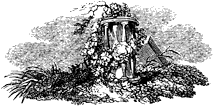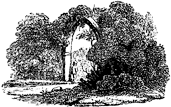|
|
[ p.iii ]
|
[ p.1 ]
|
ADDRESSED TO |
[ p.3 ]
OF
Who died at Minorca on the 25th of February
![]()
|
sleep ; Years since have past, and yet I see thee weep; Yet, yet, by busy Memory kept alive, The heart-struck Mother's griefs, alas, survive ! Is there no blessed spell, no opiate blest, To cheat a Mother's memory to rest ? Look on the lovely treasures that remain; Let these seduce thee from regrets so vain ! Oh, no: by links too powerful are allied The joy for These that live, the woe for Him that died.
In life's young season, when the world was new, |
|
He, the first pledge that Love awoke to light, Was more than angel in thy partial sight. Ah ! who can tell the youthful Mother's joy, When first her arms receiv'd her infant Boy ? When first she gave her first maternal kiss ? Ah ! what are words to paint a Mother's bliss !
Fed from thy breast, in charms the infant grew, |
|
And pause awhile from ocean's rude alarms ; The harbour of his rest a Mother's arms.
I saw, ere last the wanderer left thy side, |
|
And, blighting them, the Mother's hope to blight, The hope that promis'd such a long delight ?
Yet it were something still, if o'er the clay
Child of the Ocean ! had the troubled wave, |
|
Delusion ! could that Mother's thought have borne The bosom gash'd, the limb asunder torn, The life-blood, none perhaps it's tide to check, Effusive o'er the horror-drenched deck, The form convuls'd, the shriek of torment wild, The last dull moaning of her dying Child ? No, no, though doom'd to fall, poor Boy, 'twas well, That not in Battle's hideous fray he fell.
But give thy tears ; for those, though long they flow, |
|
I do believe, that when the Good ascend, To live the ’ empyreal life that ne'er shall end, ’Tis not denied them in that world to meet Those for whose sakes e'en this bad world was sweet ; That friends and kindred are allow'd above Each to know each again, in purer love ; That in the presence of the Great Ador'd, Again the Spouse may meet the Spouse deplor'd ; Sister and Brother form the ring again, And parted Lovers bind the broken chain ; Fathers amidst their gather'd children rest, And tender Mothers bless them and be bless'd.
I do believe the Godhead will allow |
|
And These, yet left to her who gave them birth, To cheer her further pilgrimage on earth, These, who, with youth elate and blind to care, Now round thee wanton, shall rejoin thee there. There too, where never the high heart is rack'd, Where never cares the noble mind distract, Where Feeling, Fancy, Genius, unrepress'd, May thrill, expand, exalt the ’ unburthen'd breast, There shall the generous Lyre, that here below Wafts scarce a note beside the note of woe, No more by Sorrow warp'd, by Envy jarr'd, Breathe all the lofty spirit of the Bard, Whom, while thine offspring listen to that Lyre, Their eyes and hearts shall know ; and they shall bless their Sire.
|

[ p.1 ] (image of page 1)
|
ADDRESSED TO |
[ p.3 ] (image of page 3 & page 4)
OF
Who died at Lee Priory on the 13th of June
![]()
|
thus ?--- Shall human woe the act of heaven discuss ? Shall roused Affliction lift to God it's eye, And, knowing that He will'd it, question why ?--- Tried Mother, bow thy head, and quell thy breast, And check the ’ unholy murmur ere express'd ! There was too much of good about thee still, Baffling the jealous counterpoise of ill. The draught of life was yet too strong for care ; Schemes were too quick, and hopes too busy there; So grief again, as bubbles mantled up, Was sent to tame the spirit of the cup. |
|
Ask thine own heart---descend into that cell Where lives the Priestess of Truth's Oracle, Conscience, that breathes self-knowledge : She will say, A Mother's pride too deeply rooted lay Within thy bosom ; giving thoughts of earth More room than aught terrestrial should be worth. Thy love of thine own lovely race was such As held thee fetter'd to the world too much : So Death was made thy visitor again, To break another rivet of the chain, That to thy mind's ambition might be given A freer aspiration after heaven.
Twice on the treasure of thy soul the hand |
|
A chain of light to thee and thine descending, Whereby riven hearts in mystic links are blending ; And the pure fires with which those spirits glow, Can thrill and lighten on the hearts below.
Direct thy gaze, thou cherisher of woes, |
|
Death stole upon thee in a doubtful mask ; The black destroyer wanton'd with his task ; And mock'd with promise thy maternal hope ; And gave---that's some relief---thy virtues scope. We all remember---how can we forget--- Those nightly vigils, that should sooth regret ; Those daily cares, and duties overpaid, While the youth wasted to a bloodless shade. We all remember how, until the last, Clung by his side this Mother unsurpast ; Caught every tone, consulted every look, Read every thought, and every wish o'ertook : And, in despite of pain's exerted fangs, Foil'd the tormentor of his keenest pangs.
Propp'd on his pillow as the victim lay, |
|
And feel the breeze that sometimes flew by stealth To fan his cheek, and warble words of health.--- Then came the hour !---the spirit waxing dim ; The helpless, hopeless feebleness of limb ; The wandering hands that quarrell'd with the air ; The glance that flicker'd round, but knew not where ; The language wilder than the trackless wind ; The last delirious energies of mind ; The cheeks, like wither'd aspen leaves in hue, And like those leaves all coldly shuddering too ; The quivering throat's half-choak'd and struggling cry ; And last---that fix'd expression of the eye !--- Not yet ; not yet ; it cannot yet be o'er:--- The soul still lights that face---O gaze no more, Unhappy Father ! wherefore didst thou stay, Watching the progress of thine own decay, The dread mortality of thine own flesh--- That seems in those that yet remain so fresh ? Away ! even She who watch'd as none have watch'd, She, the poor Mother with the heart unmatch'd, Dragg'd by the arm of friendship from the room, Has left him---to the agents of the tomb. |
|
Take thy last look, and let it linger not ; And let us lead thee from this blighted spot. In your sepulchral chamber, corse to corse, Ye still shall meet, in spite of this divorce ; In the eternal Kingdom, soul to soul, Ye still may live, when planets cease to roll. |

[ p.9 ]
|
|
|